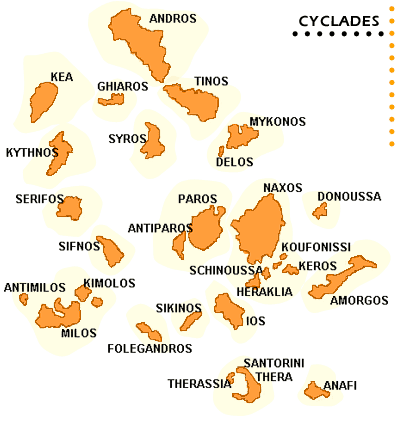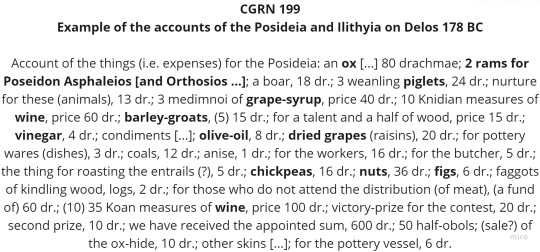#posideia
Explore tagged Tumblr posts
Note
Hey! This ask may have already been answered before, but can you talk about posidieia in you calendar? It’s a new word for me.
Thank you for your attention and for making the calendar!
Hi! I did briefly write about the festival, but I never gave a full breakdown of it. For the sake of clarity, I'm going to split this answer in two parts, starting with the historical evidence and then moving on to the festival reconstruction itself.
The evidence
The Thasian Posideia, like many of the festivals in my calendar, takes source from this inscription:

So it is one of those festivals that I factually know had a presence on the island, on top of the archaeological evidence for a sanctuary of Poseidon.
Unfortunately, this legal document doesn't give us any details about the festivals listed, so we have to look elsewhere to get an idea of what the festival is really about.
In a commentary of this inscription, François Salviat makes these observations:
The month of Poseidon is widespread in the Ionian calendar and aligns with the celebration of Posideia, primarily observed in the Aegean tradition during winter, which is normally an unfavourable season.
The antiquity of the cult of Poseidon is established through the widespread and fixed nature of Poseidon, with celebrations confirmed along the coast of Asia and in the Cyclades.
The Thasian sanctuary of Poseidon, discovered in 1927, was likely the focal point of these celebrations, marked by its vast area, though specifics remain unclear.
Continuous favour for the cult of Poseidon is evidenced through external sources such as various dedications, inscriptions, votive reliefs, and the prevalence of symbols like the trident and dolphin on amphora seals, silver coins, and even in personal names.
Since this was the most information I could get about the festival in Thasos specifically, I started looking for what was known about the Posideias in other cities, specifically Delos.
Thasos is, despite its northern location, heavily influenced by the Cyclades. This is because it was colonized by Paros and as such inherited a lot of its religious and administrative customs.

The proximity between Paros and Delos (and Delos being a major religious center) makes any evidence from this area possibly relevant.
The Posideia was also celebrated on Delos, and we thankfully have more information on the way it was celebrated there thanks to an inscription known as CGRN 199 "Example of the accounts of the Posideia and Ilithyaia on Delos", dating from 178 BC. The date being significantly more recent is also a good sign. Salvia has already established that the cult was ancient, and we can clearly see that, at least on a Cycladic level, the Posideia kept being celebrated throughout the centuries.

The inscription gives us very useful information, especially the epithets chosen for the festival: Asphaleios and Orthosios. The rest is a list of offerings and purchases for the festival, most of them being foodstuff, cooking supplies, dishes and the money allocated for wages. We are also told that the festival included a contest of some form.
Reconstruction
For reconstruction purposes, I had to go for a Delian-Thasian mix. But before that, we need to take a closer look at the epithets, since they indicate the purpose of the festival.
On the cult of Poseidon Aphaleios, Fritz Graf tells us this in "Myths, martyrs, and modernity: studies in the history of religions in honour of Jan N. Bremmer."
"the protection against earthquakes being most often attributed to Poseidon. As such, he usually has the epiklêsis Asphaleios, ‘Steadfast One’ (literally ‘He Who Does Not Stumble’); his cult is attested in many places, especially in western Asia Minor with its high incidence of earthquakes. [...] Oracles from Delphi and Didyma recommended to build altars and bring sacrifices to Poseidon Asphaleios to prevent further earthquakes;"
And Mikalson, in "Religion in Hellenistic Athens" tells us more about the inscription:
"Delos was famed for not having earthquakes (Hdt. 6.98), and credit for that no doubt should be given to Poseidon, because at his festival, the Posideia, he was honored as Asphaleios (“Securer”) and Orthosios (“Uprighter”). The festival featured contests and a banquet, and from the records of expenditures (520 drachmas in ca. 180 B.C.) for the banquet, Bruneau has calculated, at 1 1/2 obols per banqueter, about 2,000 participants, consuming about 1,600 quarts of wine. The banquet quite likely served most of the male, adult citizenry of Delos, and those few who missed it received their 1 1/2 obols in cash (257–67)."
In the case of Delos, we're looking at a festival which aims to reduce the likeliness of natural catastrophes, particularly earthquakes. While this doesn't give me any proof of it being the same for Thasos, there is evidence for the epithet Asphaleios for Paros (which is the mother-city of Thasos) through inscription SEG 15: 517 (mid-3rd c. BC), which indicates that the oracle of Delphi prescribes offering a sacrifice to Zeus Hyperdexios, Athena Hyperdexia, Poseidon Asphaleios, and Artemis Eukleia on the first altar of the Archilocheion dedicated to the Muses, Apollo Mousagetes, and Mnemosyne.
While indirect, the fact that a cult to Poseidon Asphaleios existed in Paros gives us a good reason to believe the cult was known in Thasos as well.
Now that we have our epithet, we can move on to the rest. I've been quite liberal with the offering I make for the festival, depending on how much time I have on my hands when the festival falls on the calendar, but as a rule of thumb, I try to stick with using ingredients found in CGRN 199.
Wine is always a given, and then I pick and choose from the ingredients. We know that beef and sheep are good meats to choose from, and then there are chickpeas, figs and nuts also listed. So my offering will be either all of those things or some of those things. If I have time, I'll go and find a meal that incorporates those ingredients, or I can also offer these things on their own.
At this point of the reconstruction, we have our epithet and possible offerings, and so we can move on to the tricky question of timing.
The month was easy to pin down, since there is a month of Poseidon in the Thasian calendar, but we have no other indication of time in any of the direct sources. For simplicity's sake, I chose the 26th of Poseidon. This is a direct loan from Athens, since Poseidon was honoured during the Athenian Haloa on their 26th of Poseidon (the two calendars don't always line up)
With all this pinned down, I just wrote a custom hymn for the occasion. There is obviously still room for adaptation. I don't live in a particularly seismic area of the world (unlike Greece), so if I were to make the festival more aligned with my local risks of natural catastrophes, I could use an angle of approach that focuses on floods, especially coastal floods. Thankfully, the epithet "Asphaleios", with its meaning of "securer" can easily be extended to other types of dangers.
Anyway, this got long. I hope this helps give a good idea of what the festival is about, both historically and in my personal calendar. And I hope this also helped give a good idea of how I reconstructed the festival from a mention to a more fully fledged religious event.
#posideia#posideon#poseidon#poseidondeity#poseidon deity#hellenic polytheism#hellenic paganism#hellenic pagan#thasian recon#delian recon
26 notes
·
View notes
Text
I held a winter solstice-posideia ritual to helios, poseidon, dionysus, hekate, and hestia and it felt really nice. i wish i had taken photos — i’ll remember to next time!
i don’t do a full on saturnalia, but i incorporated some elements this year since i didn’t see any family for the christmas holiday.
in turn, i saw so many people also celebrating saturnalia. it made me so happy that i think i’ll try it again next year, and expand a little more to the ritual day.
4 notes
·
View notes
Photo

Ὀγδόη Ἱσταμένου, VIII day From today's sunset: eighth day of Poseideon. The eighth day is always sacred to Poseidon and Theseus. "Poseidon Asphaleios stands for the ogdoad."
This is probably also the day of the Posideia, the most important festival in honor of Poseidon during His sacred month. It is also prescribed a private sacrifice of a flat cake (popanon) and a libation without wine to Poseidon Chamaizelos ('earth-bound') (IG II2 1367)
"The eighth and the ninth of the month that begins: these are the best days to accomplish the man's works: (Hesiod) praises the eighth and ninth plausibly as they carry perfection (syntelestikai) and therefore he has dedicated them to the human activities...one (the eight), by having a perfect dimension, the other (the nine), by deriving from a perfect number (the three), bring to accomplishment the works undertaken in them." Schol. Erga, 772-773
(Poseidon with trident and a libation bowl. Archaeological Museum of Paestum)
14 notes
·
View notes
Text

While most of my Athenian-focused peeps are busy preparing the Theogamia, I'm celebrating the Posideia. The festival was attested on Thasos in the 4th century BC, but the details are otherwise unknown. For reconstruction purposes, I used the details given by this inscription (CGRN 199) from Delos - without going into painstaking details, Delos was once under Parian control and Thasos is religiously affiliated to Delos via its mother-city (Paros) -
I thankfully found a recipe that fit a great number of the ingredients listed in the inscription, so I rolled with that, only replacing the wheat with barley.
63 notes
·
View notes
Text
I had completely forgotten that Poseidon would receive a sacrifice on the Athenian Theogamia as well, and now I lowkey feel validated by the completely arbitrary choice I made when placing the Posideia at this time of the month.
#seriously i should look into it because this could very well be something athens got from ionic influence#which could very well validate the timing#i'm thinking out loud now
8 notes
·
View notes